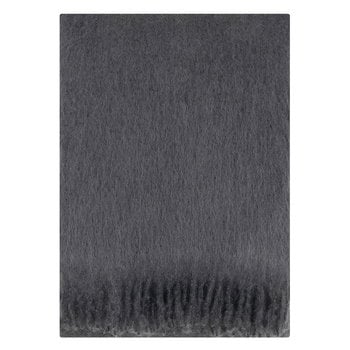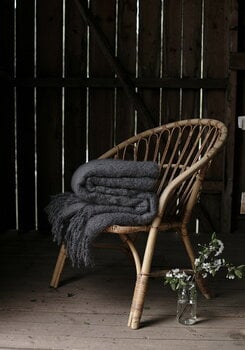The warm character and texture of the Saaga Uni blanket, designed by Marja Rautiainen for Lapuan Kankurit, comes from a combination of soft mohair yarn and wool. Wrap yourself in the blanket while relaxing on a sofa or napping on a bed, and add a fluffy element to the home decor with gentle colors of the blanket. Saaga Uni is made of mulesing-free South African mohair and New Zeeland wool, designed in Finland and produced in a Lithuanian sewing company.
Saaga Uni mohair blanket, smoke
Lapuan Kankurit
Description
The warm character and texture of the Saaga Uni blanket, designed by Marja Rautiainen for Lapuan Kankurit, comes from a combination of soft mohair yarn and wool. Wrap yourself in the blanket while relaxing on a sofa or napping on a bed, and add a fluffy element to the home decor with gentle colors of the blanket. Saaga Uni is made of mulesing-free South African mohair and New Zeeland wool, designed in Finland and produced in a Lithuanian sewing company.
Product details (5)
- Material
- 70% mohair and 30% pure new wool. Contains small amount of nylon.
- Colour
- Smoke
- Length
- 66.93 in (170 cm)
- Width
- 51.18 in (130 cm)
- Care instructions
- Hand wash at max. 30°C or dry clean
- Product ID
Designer
Marja Rautiainen is a Finnish textile designer, who is especially known for her work with the Finnish weaving company Lapuan Kankurit. The Corona wool blanket, designed by Rautiainen for Lapuan Kankurit, won the Finnish design award Muoto 2015, and her other well-known textile designs include the Paanu and Alva patterns.
View all productsReviews (1)
5
Based on 1 reviews
-
M
Maria K
Beloeil, Canada
So soft and luxurious. What a treat. My family fights over this blanket, highly reccomend it. The quality is amazing.
278 days ago
Sustainability
The Product Sustainability Framework, our criteria of sustainable design, helps you find the most sustainable products in our selection. Read below which sustainability criteria this product has met.
Working conditions & labour 9/9
-
Equal opportunities for all employees
-
Commitment to UN Global Compact, fair compensation for all employees
-
Corporate responsibility requirements defined and communicated for suppliers
-
Systematic work for improved inclusion and well-being in the workplace
-
Transparent supply chain
-
Suppliers' compliance to a code of conduct ensured
-
Direct suppliers audited and certified
-
Compliance to the UN Guiding Principles on Business and Human Rights ensured in the supply chain
-
Support for community involvement in the supply chain
Eco-friendly production 9/9
-
Fair and resource-wise water-use in production
-
No incineration or landfilling of returned items
-
No use of endangered species as materials
-
No direct environmental emissions or waste (excl. GHGs) from production
-
The sustainability of direct suppliers' production is addressed and monitored
-
Production and material sourcing that respect biodiversity, animal rights, and natural ecosystems
-
Material-efficient and ecological packaging
-
Positive impact on nature’s well-being through operations that regenerate natural ecosystems
-
No potentially harmful chemicals used in own production
Climate impact 5/8
-
Company's direct greenhouse gas emissions identified and commitment to reduction
-
Product's carbon impact identified and commitment to reduction
-
Guidance on energy- and eco-efficient use of the product
-
Contribution to climate initiatives beyond the brand’s direct operations
-
100 % renewable energy in own production and operations
-
Low-carbon or compensated transportation
-
Carbon footprint of the product calculated and goals set to reduce it
-
Carbon neutral or carbon negative product
Sustainable materials 5/6
-
Sustainable and long-lasting material choices
-
No harmful or hazardous substances
-
Responsible raw material sourcing and production
-
Materials suited for circularity: monomaterials, recyclable finishings, renewable or recycled contents etc.
-
Ecological materials: natural, biodegradable, recyclable or recycled contents
-
Outstanding materials in terms of innovativeness, responsibility, sustainability and circularity: local production or sourcing, 100 % recycled content, C2C-certification etc.
Circular design 5/5
-
High aesthetic quality promoting long-term use of the product
-
Technically durable product design and material choices
-
Design for enduring life-long quality
-
Design and support for product maintenance, repair and upgradability
-
Innovative circular design solutions: circular service system, resale platform, remanufacturing, collection of used products, etc.







